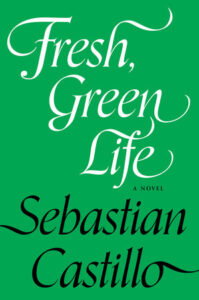
[Soft Skull Press; 2025]
Not much is fresh or green for Sebastian, though he sure wishes it were. One day, after an amphetamine-induced episode of tachycardia, a creative writing teacher stands on his desk while teaching a class, falls off, breaks his nose and loses a few front teeth. After this embarrassing episode, the narrator of Venezuelan author, Sebastian Castillo’s latest novel, Fresh, Green Life, decides to retreat from the world, vowing a year of silence.
During his self-imposed exile, not saying a word and spending most of his time either at the gym or holed up in his apartment, the novel’s narrator, also named Sebastian Castillo, tries to better himself. For the narrator, this means cutting all ties with the outside world. As in Tarkovsky’s Andrei Rublev (a film frequently referenced in the novel), a man isolates himself in an attempt to restore his own integrity and, ultimately, his faith. After committing an act he deems unforgivable, Andrei Rublev goes silent. Fresh, Green Life offers a Rublev-esque tale with touches of academic satire, and a harsh but convincing portrayal of self-delusion.
Stylistically, Fresh, Green Life owes a lot to Thomas Bernhard, the infamously cranky twentieth-century Austrian novelist. Structured in two unbroken sections, this short novel is entirely written in monologue — a form that perfectly fits the narrator’s delusion and search for self-improvement. But Castillo has created a sympathetic, if flawed, character who stands apart from Bernhard’s bitter narrators. Where Bernhard’s characters are maniacal and suffocated by failure, Castillo softens the narrative lens. Here, the narrator is mired in doubt with just the right dose of obsessive-compulsiveness.
The novel begins on New Year’s Eve. It’s been ten years since Sebastian graduated college, and he’s accepted an invitation to a New Year’s party at his former professor’s house. Professor Aleister has invited Sebastian with the promise of seeing not only his former pals Robert and Thomas, but also Maria, the college crush Sebastian hopes to reconnect with. He’s even willing to break his resolution of silence if it means he’ll have a chance of talking to Maria. Sebastian and this former professor have been disconnected for several years when the novel takes place. But Professor Aleister knows exactly how to get young Sebastian’s attention, literally italicizing Maria’s name in his email invitation. Reading the email, the novel’s narrative voice is taken over by Sebastian’s flights of fancy. His preoccupations with Maria are woven seamlessly with the confession of his health scare and eventual trip to the professor’s. The novel has a “plot,” but its monologue style lets readers relish in the narrator’s memories of Maria and his former classmates, as well as his disastrous time spent teaching. Having not seen each other in ten years, the narrator frequently ponders what might become of his and Maria’s first encounter since his exile. Sebastian describes the measures he’s taken to improve himself since he last saw Maria:
I am no model, surely, but in the past several years I’ve taken an utmost interest in my health after a minor heart scare, a heart scare that should not have happened at my age, and I consequently began exercising six days a week.
In a telling passage, the narrator also imagines that when he sees Maria, she will be so overwhelmed by his new self that she will fall over herself to compliment him. It’s not believable, but his fantasies of Maria are propulsive. The narrator’s obsession with winning Maria’s approval causes one to wonder who exactly he wants to change for: himself, or others? By showing the narrator’s solipsism and fantasies, Castillo achieves well-earned moments of pathos:
She would say: Sorry if this is stupid, but Sebastian, you look different! And I would, of course, then deliver a speech I had more or less drafted in my mind … I would say: It was with great difficulty that I had come to possess the current changes in my body that you note tonight, Maria.
Castillo seems to want us to both laugh at Sebastian and feel a little sorry for him. While totally clueless, the humor of his insecurity is on full display. The narrator references his physical changes and gym commitment often. These moments subtly poke fun at contemporary masculinity, and Sebastian is exactly the sort of guy who buys into it. Castillo parodies standard masculine vices: hitting the gym, “‘or “the academy, like the Portuguese (say)”, since “the academy is not merely a place to cultivate the mind, but the body, too.’” He binges self-help “bro science” videos in a half-furnished apartment; he indulges in stoicism, “Next to the mirror I had pasted a quotation: “All of humanity’s problems stem from man’s inability to sit quietly in a room alone,” Sebastian says. Sebastian tries each fad resulting in little, if any, positive changes.
But whether or not the narrator evolves is irrelevant. It’s his daydreaming that propels the narrative and engages the reader. Not just because of long sentences, or languid interiority, but because the narrator actually reveals himself through his delusions. It’s clear the narrator won’t see Maria, which steeps the novel in a bittersweet tone. But Castillo handles the narrator’s obsession with a light touch, giving readers a perfect view of this Quixotic quest. Sebastian is bookish and obsessive. He tiptoes between the present (New Year’s Eve), the past (health scares, Maria) and the future (a new year). I can’t recall the last novel I read that captured delusion in such a believable way. It’s that same weaving of past, present, future that makes Sebastian’s sadness feel human.
Besides Andrei Rublev, the novel references many other authors, which is fitting as the narrator is an adjunct writing teacher. Each reference feels like Castillo is winking at the reader, referencing works adjacent to Fresh, Green Life as if he’s writing in real time. It has a delirious metafictional effect, amplifying the narrator’s navel-gazing tendencies. References like the exile of Andrei Rublev, or the narrator’s hatred of Rilke’s Letters to a Young Poet read as projections of his own cynicism about teaching creative writing. Proust reminds him of memories of Maria.
The academic satire in Fresh, Green Life takes aim at “the uselessness of creative writing” and the thanklessness of teaching. While grim, Castillo manages to make these observations entertaining. While academics seem to be the novel’s punchline, the narrator’s struggles as a teacher warrant sympathy. He became an adjunct instructor of first year composition after studying creative writing. Which, in his words, is “a first-order badly paid mercenary for the university system.” Ranting about the system of education he says:
I was employed to teach a course that none of my students wanted to take, but which they were required to pass, in the hope, the university would argue, that these same students would receive a well-rounded liberal arts education. This was of course a lie.
Sebastian’s daydreaming and delusions are perfectly balanced by the callous Professor Aleister. When they finally meet for the professor’s New Year’s Eve party in the novel’s second half, Sebastian notices no cars in the driveway. He rings the doorbell several times with no sight of partygoers in the windows. He tries to open the door and finds it’s been unlocked, so he steps inside to a dark foyer. He observes, with a philosophical reference: “Dried, withered leaves littered the ground all over, and they crunched underneath me as I walked over them. An image foolishly came to me: I am the released captive, returning to Plato’s cave.” It turns out Professor Aleister is the only attendee.
The professor’s house is portrayed as a cartoon genius’ lair. Books are stacked to the ceiling, filling the fridge and freezer, which Sebastian notices while looking for a beer. The professor has an eerie sense of Sebastian’s real intentions for attending the party. Noticing that Sebastian is looking for an excuse to leave, the professor observes he had nothing better to do but “drink alone” and “play with himself.” Caricature or not, Professor Aleister is easily the most quotable character in Fresh, Green Life. His party scene monologues describe the theory of the “fake-real,” a term used by Professor Aleister that describes the whole novel’s thesis: reality and our own perception must constantly be questioned. Professor Aleister says:
Math is fake, but at least math is more real-fake than philosophy, which is fake-fake. Even the total failures of literature — pharmacy-store paperbacks, amateur work of the poorest caliber — even these examples are more fake-real than the most sublime work of philosophy, which is always fake-fake. I’ve dedicated my life to boring nonsense, it seems, I would say, when I should have dedicated my life to delicious nonsense.
Sebastian sits through this mind-numbing sermon and never says a word. He struggles to decide whether or not he should leave but ultimately does, walking through the cold night to catch a train home.
Fresh, Green Life is the confession of a man having what you might call a crisis of faith. Given Castillo’s use of his own name for his protagonist and the biographical details he gives the narrator, it’s easy to call Fresh, Green Life a work of autofiction. Its an example of the best kind — if autofiction is what Castillo is aiming for — where the author openly laughs at himself. Castillo himself has taught writing, and Fresh, Green Life even makes sly reference to 49 Venezuelan Novels, mentioned here as 57 Colombian Novels, the author’s first published story collection. It’s hard not to assume that the narrator’s struggles as both a writer and teacher are also Castillo’s own and that the novel’s circular, all-consuming monologue is Castillo’s attempt to exercise his own artistic doubts. Still, the specific biographical details aren’t what drive this novel. Academia and exile just happen to be the perfect conduits for Castillo’s tale of over-educated malaise.
David Dufour is a writer from Louisiana. He co-hosts Patio, a monthly NYC-based reading series.
This post may contain affiliate links.






